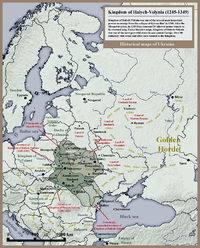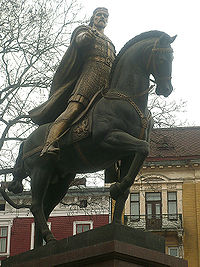- Daniel of Galicia
-
Danylo Halytskyi
Данило I Галицький
Daniel of Galicia King of Rus' Reign 1253–1264 Successor Lev Danylovych Spouse Anna of Novgorod
NN, sister of MindaugasIssue Irakli Danielvich
Lev I of Galicia
Roman Danielvich
Ustynia
Sofia Danielvna
Svarn
Pereyaslava
Mstyslav DanielvichHouse Rurik Father Roman Mstyslavych Mother Anna from Byzantium Born 1201
Halych (now Ukraine)Died 1264
Khelm (modern Chełm, Poland)Daniel I of Galicia or Daniel Romanovych or Danylo Halytskyi (Ukrainian: Данило I Галицький) was a King of Galicia (Halych) (1205–1255), Peremyshl (1211), and Volodymyr (1212–1231). He was crowned by a papal archbishop in Dorohochyn 1253 as the first King of Rus' (1253–1264).
Contents
Biography
In 1205, after the death of his father, Roman II Mstyslavich, the ruler of Galicia–Volhynia, the boyars of Galicia forced the four-year-old Daniel into exile with his mother Anna of Byzantium and brother Vasylko Romanovich. After the boyars proclaimed one of their own as prince in 1213, the Poles and Hungarians invaded the principality, ostensibly to support the claims of young Daniel and Vasylko, and divided it between themselves. In 1219 he renounced his claims to Galicia in favor of his father-in-law Mstislav the Bold.
In 1221 Daniel re-established his rule over Volhynia, where the boyars and populace had remained loyal to his dynasty. In 1234 he defeated Alexander Vsevolodovich, taking Duchy of Belz. By 1238, he had defeated the Dobrzyń Knights, and regained most of Galicia, including the capital at Galicia. While the Prussians were under pressure from the Teutonic Order, Daniel attempted to conquer the related Yatvingians.
The following year, Daniel acquired Kiev, the traditional capital of the defunct state of Kievan Rus'. Faced with the Mongol menace, he sent his commander Dmytro to defend the city. However, after a long siege its walls were breached and despite fierce fighting within the city, Kiev fell on December 6, 1240 and was largely destroyed. A year later, the Mongols passed through Galicia and Volhynia while campaigning against the Poles and Hungarians, destroying Galicia. On August 17, 1245, Daniel defeated a combined force of the Prince of Chernihiv, disaffected boyars, and Hungarian and Polish (see also Order of Dobrin) elements at Yaroslav and finally took the remainder of Galicia, thus reconstituting his father's holdings. He made his brother Vasylko ruler of Volhynia and retained the Galician title for himself, though he continued to exercise real powers in both places.
 Territorial boundaries of the Kingdom of Galicia–Volhynia (1245-1349).
Territorial boundaries of the Kingdom of Galicia–Volhynia (1245-1349).
Daniel's domestic policies focused on stability and economic growth. During his rule, German, Polish, and Rus' merchants and artisans were invited into Galicia, and numbers of Armenians and Jews established themselves in the towns and cities. Daniel founded the towns of Lviv (1256) and Kholm (naming the former for his son), and fortified many others. He appointed officials to protect the peasantry from aristocratic exploitation and formed peasant-based heavy infantry units.
Yet Daniel's successes and his failed defense of Kiev attracted the further attention of the Mongols. In 1246, he was summoned to the capital of the Golden Horde at Sarai on the Volga River and was forced to accept Mongol overlordship. According to the Ukrainian historian Orest Subtelny, Daniel was handed a cup of fermented mare's milk by the Mongol khan Batu and told to get used to it, as "you are one of ours now."
 Monument to King Daniel in modern-day Lviv.
Monument to King Daniel in modern-day Lviv.
While formally accepting the Mongols as overlords, and supplying them with soldiers as required, Daniel built a foreign policy around opposition to the Golden Horde. He established cordial relations with the rulers of Kingdom of Poland and Kingdom of Hungary, and requested aid from Pope Innocent IV in the form of a crusade. In return for papal assistance, Daniel offered to place his lands under the ecclesiastical authority of Rome, a pledge never realized. Wooed by the prospect of extending his authority, the pope encouraged Daniel's resistance to the Mongols and his Western orientation, and in 1253, had a papal representative crown Daniel at Dorohochyn on the Bug River. Danylo wanted more than recognition, however, and commented bitterly that he expected an army when he received the crown.[1] The following year, Daniel repelled Mongol assaults led by Orda's son, Kuremsa, on Ponyzia and Volhynia and dispatched an expedition with the aim of taking Kiev. Despite initial successes, in 1259, a Mongol force under Burundai and Nogai Khan entered Galicia and Volhynia and offered an ultimatum: Daniel was to destroy his fortifications or Burundai would assault the towns. Daniel complied and pulled down the city walls.
In the last years of his reign, Daniel engaged in dynastic politics, marrying a son and a daughter to the offspring of Mindaugas of Grand Duchy of Lithuania and acquiring territorial concessions in Poland from the latter. Another daughter of his, Ustynia, was married to Prince Andrey Yaroslavich of Vladimir-Suzdal. He also arranged for the marriage of his son Roman to Gertrude, the Babenberg heiress, but was unsuccessful in his bid to have him placed on the ducal throne of Austria.
By his death in 1264, Daniel had reconstructed and expanded the territories held by his father, held off the expansionist threats of Poland and Hungary, minimized Mongol influence on Western Ukraine, and raised the economic and social standards of his domains. He was succeeded in Galicia by his son Lev.
Family
Mother
- Anna, allegedly a Byzantine noblewoman (+ after 1219), Princess of Galicia–Volhynia ca 1200–1205, Grand Princess of Kiev 1203–1205
Father
- Roman the Great (* ca 1150, + murdered nr Zavikhvost 19 June 1205), Prince of Novgorod 1168–1170, Prince of Volynia 1173–1187, 1188–1205, Prince of Halych 1187–1188, 1199–1205, Grand Prince of Kiev 1203–1205
Wives
- Anna of Novgorod (+ bef. 1252), 1218, daughter of Mstislav the Bold
- NN, sister of King Mindaugas of Lithuania, bef. 1252
Brother
- Vasilko Romanovich (* 1203, + 1269), Prince of Belz 1207–1211, Prince of Brest 1221–1231, Prince of Volhynia 1231–1269
Sisters
- Feodora of Galicia (+ after 1200), m. 1187 (div 1188) Vasilko of Galicia
- Maria of Galicia (+ after 1241), m. before 1200 Michael of Chernigov, sometime Grand Prince of Kiev and ultimately a saint.
Sons
- Irakli Danielvich (*ca 1223, +by 1240)
- Lev I of Galicia (*ca 1228, +ca 1301), Prince of Belz 1245–1264, Prince of Peremyshl 1264–1269, Prince of Halych 1269–1301, Prince of Halych-Volynia 1293–1301 ; he moved his capital from Halych to the newly-founded city of Lviv(Lwów, Lemberg), m. 1257 Constance, daughter of Béla IV of Hungary.
- Roman Danielvich (*ca 1230, +ca 1261), Prince of Black Ruthenia (Navahradak) 1255? - 1260?, and Slonim
- Mstyslav Danielvich (+aft 1300), Prince of Lutsk 1265–1289, Prince of Volynia 1289 - aft 1300
- Svarn (Shvarno, Švarnas, Ioann; +1269, bur. Chełm), Grand Duke of Lithuania 1264–1267 (1268–1269?), Prince of Chełm 1264–1269
Daughters
- Pereyaslava (+ 12 April 1283), m. ca 1248 Prince Siemowit I of Masovia
- Ustynia, m. 1250/1251 Prince Andrew II of Vladimir-Suzdal
- Sofia Danielvna, m. 1259 Graf Heinrich V von Schwarzburg-Blankenburg
See also
- List of Ukrainian rulers
- List of rulers of Galicia and Volhynia
- Crown of Rus
References
- ^ John Joseph Saunders. (2001). The history of the Mongol conquests. Philadelphia: University of Pennsylvania Press, p. 101
- Subtelny, Orest (1988). Ukraine: A History. Toronto: University of Toronto Press. ISBN 0-8020-5808-6.
External links
- Daniel Romanovych at the Encyclopedia of Ukraine
- Genealogy of Daniel's family
Daniel of GaliciaBorn: 1201Preceded by
Roman MstislavichPrince of Galicia-Volhynia
1238–1264Succeeded by
Lev I of GaliciaPreceded by
Rostislav III of KievGrand Prince of Kiev
1239–1264Categories:- 1201 births
- 1264 deaths
- Kingdom of Galicia–Volhynia
- Rulers of Kievan Rus'
- Ukrainian kings
- 13th-century Russian princes
- Rurikids
- Rurik Dynasty
- Orthodox monarchs
- Ukrainian genealogy
Wikimedia Foundation. 2010.
